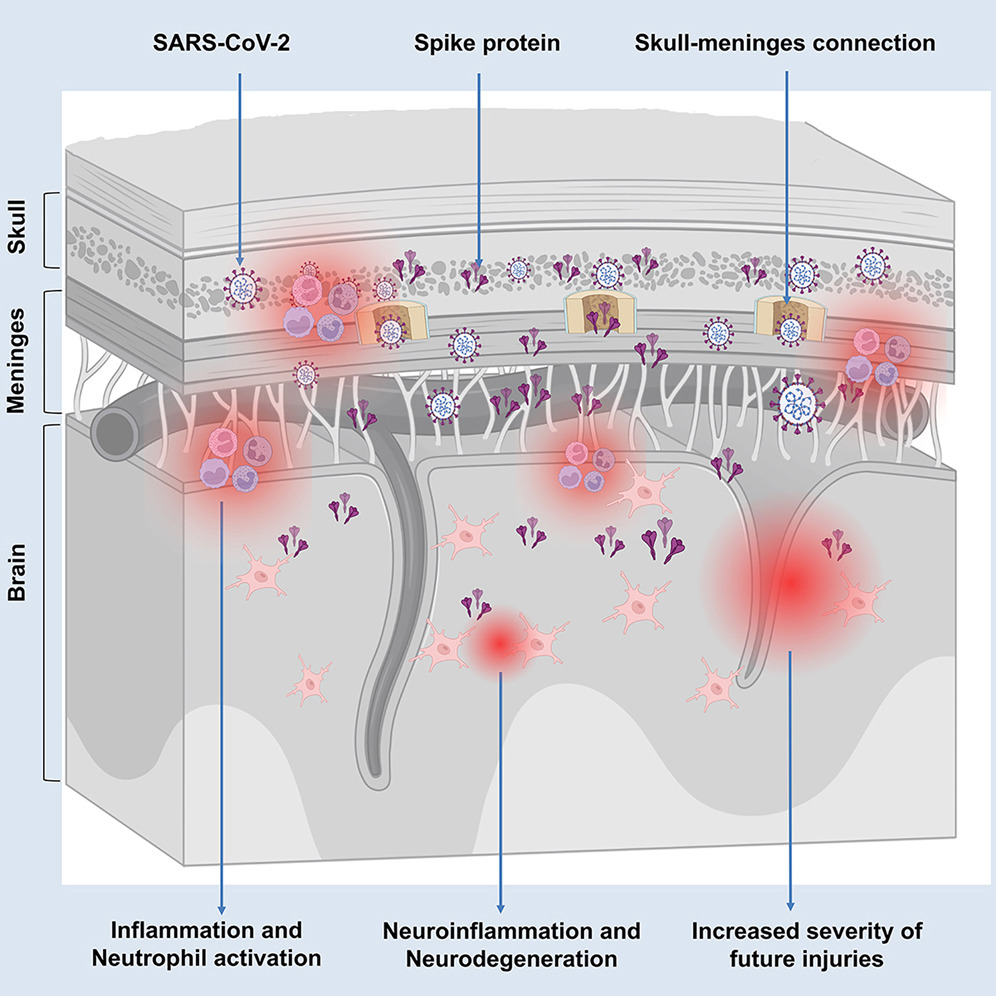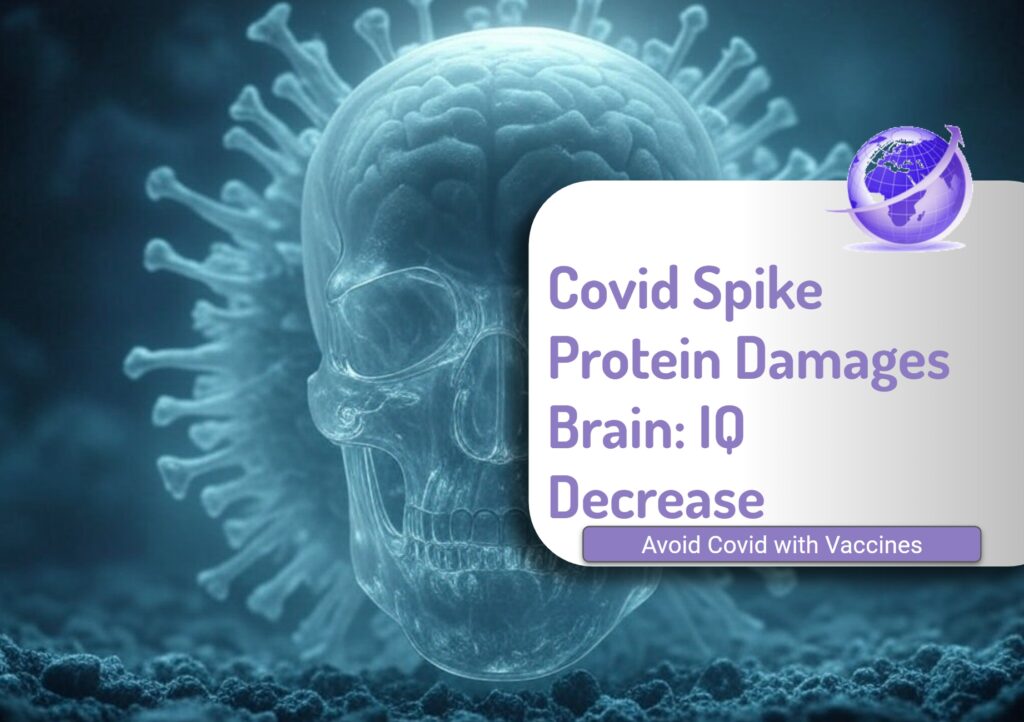Prof Ali Max and his team shows Covid spike protein damages the brain and demonstrates why Covid reduces IQ. Prof Max and his colleagues demonstrated SARS-CoV-2 spike protein accumulates and persists in the body for years after infection. Their research used both mouse models and human post-mortem examinations. The spike protein was associated with vascular, and inflammatory changes in the brain along with neuronal damage.
This paper provides a mechanism for the brain fog associated with long covid. Read the paper in full for more information.
Covid and Skull-Meninges Connection Diagram

Research Approach
Researchers used unbiased DISCO clearing technology and mapped tissues hit by coronavirus spike versus influenza HA proteins (flu) to discover all tissues targeted by Sars-CoV-2.
Findings
Key findings as described by the authors include the following
- They discovered spike accumulations in the skull marrow niches and recently discovered skull-meninges connections (SMCs),. This revealed a new route of pathogens into the brain. The spike protein was in many other organs, not just the brain.
- In people who died from covid-19, spike protein is found in the skull bone marrow niches, and meninges.
- Although COVID-19 patients’ brain tissue was PCR-negative, spike protein was present in the brain. This suggests a longer half-life compared to viral particles.
- Lots of normal functions became abnormal. Using unbiased proteomics. Several dysregulated proteins are involved in the neurodegeneration, coagulation cascades, neutrophil degranulation, and the PI3K-AKT signaling in the skull marrow, meninges, and brain of COVID-19 patients.
- Could bring on the damage artificially. SARS-CoV-2 spike S1 protein i.v. injection alone was enough to trigger a wide range of proteomic changes in the skull marrow, meninges, and brain compared to the HA protein. These changes are similar to those observed in virus-infected human samples.
- Iinjection of spike protein directly into skull marrow resulted in acute and long-term neuronal injury in mouse brain cortex tissue. This injury was observed as cell death and increased APP expression, while influenza HA did not lead to any changes.
- Strikingly, spike accumulation occurs in ~60% of people who had COVID-19 in the past long after their recovery. Thus, the identified spike in the human skull beyond the viral detection time might be a co-factor in developing long-term COVID-19 symptoms.
Outcomes
- Patients with Long COVID showed significantly elevated levels of neurodegenerative disease-related proteins, such as Tau protein and neurofilament light chain (NfL), in their cerebrospinal fluid in comparison to the control group.
- You get an immune response and inflammation. This immune response triggered by the spike protein may activate the MAPK-JNK signaling pathway, leading to neuronal stress and inflammation.
- Spike protein worsen brain tissue damage. In stroke and traumatic brain injury mouse models, the spike protein exacerbates brain tissue damage, suggesting that it may enhance the susceptibility of the nervous system to further insults.
Prevention
- mRNA vaccines reduced damage. The accumulation of spike protein in mice vaccinated with the BioNTech/Pfizer vaccine was significantly reduced, but not completely eliminated. This suggests that vaccination can significantly reduce the long-term effects of the virus on the nervous system, providing important support for reducing the risk of sequelae of COVID-19.
Video of Conclusions
This video highlights the summary
Section view of a COVID-19 patient’s skull sample shows spike protein in the skull marrow. Tje background is gray and the spike protein in red. A 3D reconstruction of a COVID-19 patient’s skull with dura sample reveals spike protein in the skull marrow, skull-meninges connections, and meninges. The background is blue, the spike protein is red, nuclei labeled with PI are cyan, and the dura mater is yellow.
Covid Reduces IQ
Researchers have shown Covid-19 leaves it mark on IQ. Even mild COVID-19 can lead to the equivalent of seven years of brain aging. As reported in The Conversation states
“From the very early days of the pandemic, brain fog emerged as a significant health condition that many experience after COVID-19. Brain fog is a colloquial term that describes a state of mental sluggishness or lack of clarity and haziness that makes it difficult to concentrate, remember things and think clearly. Fast-forward four years and there is now abundant evidence that being infected with SARS-CoV-2 – the virus that causes COVID-19 – can affect brain health in many ways. In addition to brain fog, COVID-19 can lead to an array of problems, including headaches, seizure disorders, strokes, sleep problems, and tingling and paralysis of the nerves, as well as several mental health disorders.”
Clinical implications and future research directions
Diagnosis
An important indicator for evaluating the sequelae of COVID-19 are neural injury markers in cerebrospinal fluid.
Treatment:
In the future, strategies for the removal or inhibition of spike proteins may become an important way of treating the sequelae of COVID-19.
Summary
Long COVID as a name is disappearing and replaced by fatigue, fever, shortness of breath, pounding heart, chest pain, joint or muscle pain, rash, diarrhea, changes in menstrual cycle, changes in smell or taste, headache, depression, sleep disorder, memory loss, poor concentration, and IQ decline.
References
- Rong et al., 2024, Cell Host & Microbe 32, 1–19 December 11, 2024 ª 2024 The Author(s). Published by Elsevier Inc. https://doi.org/10.1016/j.chom.2024.11.007 https://www.cell.com/cell-host-microbe/fulltext/S1931-3128(24)00438-4
- Ali Mark Turke Summary of his paper https://x.com/erturklab/status/1862524693640564871
- COVID-19 Leaves Its Mark on the Brain. Significant Drops in IQ Scores Are Noted. 2024. https://www.scientificamerican.com/article/covid-19-leaves-its-mark-on-the-brain-significant-drops-in-iq-scores-are/
- Mounting research shows that COVID-19 leaves its mark on the brain, including significant drops in IQ scores Feb 2024 https://theconversation.com/mounting-research-shows-that-covid-19-leaves-its-mark-on-the-brain-including-significant-drops-in-iq-scores-224216









